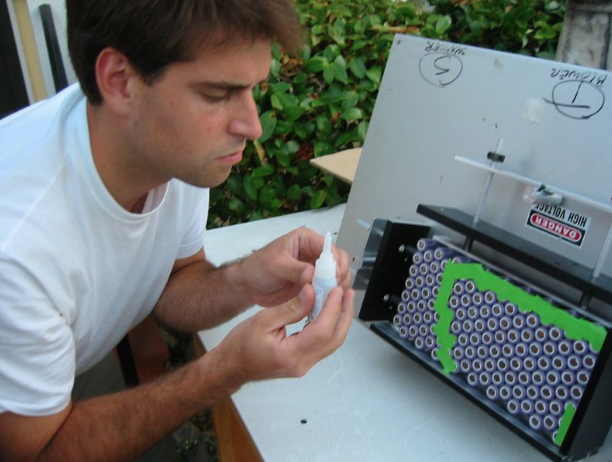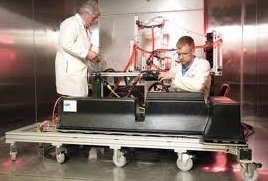Tesla losing Straubel: Tesla, Inc., has taken a big loss with the departure of one of its founders, chief technology officer JB Straubel. At the beginning of Wednesday’s quarterly report, CEO Elon Musk made the stunning announcement along with news on the delivery of 95,356 electric vehicles during the past  quarter. Straubel is credited with playing a pivotal role in the development of Tesla’s power systems and battery technology. The photo you see is of Straubel from 2004 in his backyard gluing lithium ion batteries to a case as part of the company’s first concept vehicle. Retiring at age 43, Straubel was still in his twenties when he became convinced that new and innovative li-ion batteries could become the power source for mass produced EVs. Straubel met Musk in 2003, when they had lunch in Los Angeles near the headquarters of Musk’s other passion in life — his rocket company, Space Exploration Technologies Corp. (SpaceX). Two other entrepreneurs, Martin Eberhard and Marc Tarpenning, were in on the early days of the company, working with Straubel and Musk to launch the company. Eberhard and Tarpenning left Tesla in 2008, as disputes came up over the future of the company — and as Musk exerted more control.
quarter. Straubel is credited with playing a pivotal role in the development of Tesla’s power systems and battery technology. The photo you see is of Straubel from 2004 in his backyard gluing lithium ion batteries to a case as part of the company’s first concept vehicle. Retiring at age 43, Straubel was still in his twenties when he became convinced that new and innovative li-ion batteries could become the power source for mass produced EVs. Straubel met Musk in 2003, when they had lunch in Los Angeles near the headquarters of Musk’s other passion in life — his rocket company, Space Exploration Technologies Corp. (SpaceX). Two other entrepreneurs, Martin Eberhard and Marc Tarpenning, were in on the early days of the company, working with Straubel and Musk to launch the company. Eberhard and Tarpenning left Tesla in 2008, as disputes came up over the future of the company — and as Musk exerted more control.
Straubel brought a much needed calm and balance to Musk’s approach to running the company, which includes Musk making extreme demands of the company’s corporate leadership and workforce. He was known for providing insight and clarity to the technical points that could come up with shareholders and Tesla engineers. His role as a problem-solving engineer has come through as the company has had to overcome several obstacles. He’s been known for being much more easygoing and approachable than the CEO — and that’s included participating at Tesla vehicle rides and demos. He’s also become known as a leading innovator in EV batteries, energy storage, and propulsion. It’s now his time to move on. “It has been a really tough decision because I feel like I’m letting a lot of people down,” Straubel said. “But, also, you have to live life. I love inventing and creating and building things and am at peace knowing that about myself and wanting to reorient my life. I’m decompressing for a bit and having a little break, but I will have more to say in a few weeks.”
Four automakers backing California standards, Colorado makes deal on ZEVs: Ford, BMW, Honda, and Volkswagen, signed a deal Thursday with the California Air Resources Board to comply with the state’s clean air admissions standards. They’re now siding with California’s mandate to produce fleets averaging around 51 miles per gallon by 2026, one year after the Obama-era target. This precedes an expected announcement later this summer from the Trump administration on a rollback of existing fuel economy and emissions standard targets, and taking away California’s right to set more stringent rules under the Clean Air Act (i.e., one national standard) to avoid what a Trump spokesman called a “PR stunt.” California’s Governor Gavin Newsom spoke to reporters on reducing greenhouse gas emissions, with vehicle emissions being “perhaps the most significant thing this state can do, and this nation can do, to advance those goals. The Trump administration is hellbent on rolling them back. They are in complete denialism about climate change.”
In related news, automaker trade groups representing 99 percent of U.S. car and truck sales made an agreement with the state of Colorado to join the California zero emission vehicle program starting in the 2023 model year. The state agreed to allow automakers to earn credits for selling electric vehicles in the two model years prior and use other transitional credits available in other states. The Colorado agreement must be approved by the state’s Air Quality Control Commission at a meeting set for later this month. The automaker trade groups issued a statement praising the state’s flexibility in addressing their concerns “by providing the support Coloradans need to buy electric vehicles while allowing auto manufacturers to transition into Colorado’s ZEV program.”
Comeback for diesel engines: The 2020 Chevrolet Silverado 1500 won the ranking as the most fuel-efficient light-duty truck on the market. General Motors’ pickup achieves an EPA-estimated 33 mpg on the highway and 23 mpg in the city when equipped with the new 3-liter inline six-cylinder Duramax diesel engine and rear-wheel drive. Its the first diesel engine offered in a Chevy light-duty truck since 1997. Light-to-heavy-duty pickups trucks have been a saving point for diesel engines since the September 2015 collapse following Volkswagen’s confession that the company had been dishonest about emissions reporting in its “clean diesel” passenger cars. Now GM will be following market leader Ford on the diesel pickup side, with Ford leading from sales of 94,626 diesel light and heavy-duty pickup trucks during the first half of this year.
Will 5G networks make it?: One significant area to follow is how the new 5G wireless networks are facing an uphill battle for becoming the industry norm. The stakes are huge, with 5G ready to help save thousands of lives in self-driving cars, along with reducing traffic congestion and emissions. Europe is trying out auctioning off its bandwidth spectrum to monetize the new technology, a very expensive prospect for wireless carriers and partners. Check out this commentary by Roger C. Lanctot, a Strategy Analytics executive, on the challenges BMW and its German partner Deutsche Telekom have in building a consistent and reliable network of 5G wireless connectivity in the market. It’s a challenge faced in the U.S. and other key global markets adopting 5G. “We don’t need 10 Mbit/s, but rather basic bandwidth and guaranteed latency. We need coverage,” said BMW senior VP of electronics Christoph Grote at the recent Automobil-Elektronik Kongress in Ludwigsburg, Germany.
China partnership: BYD and Toyota announced on July 19 in Toyota City, Japan, that they have signed an agreement for the joint development of battery electric vehicles, which will be electric sedans and sport-utility vehicles. The two parties will jointly develop sedans and low-floor SUVs as well as the onboard batteries for these vehicles and others. They’ll be launched in the Chinese market under the Toyota brand at some point in the first half of the 2020s. This joint venture partnership will help resolve Toyota’s ambitions to use electric vehicles to break into China, the market where the company remains well behind other global automakers. It also ties into climate change strategies as both BYD and Toyota seek to reduce carbon emissions by promoting the widespread use of BEVs.

